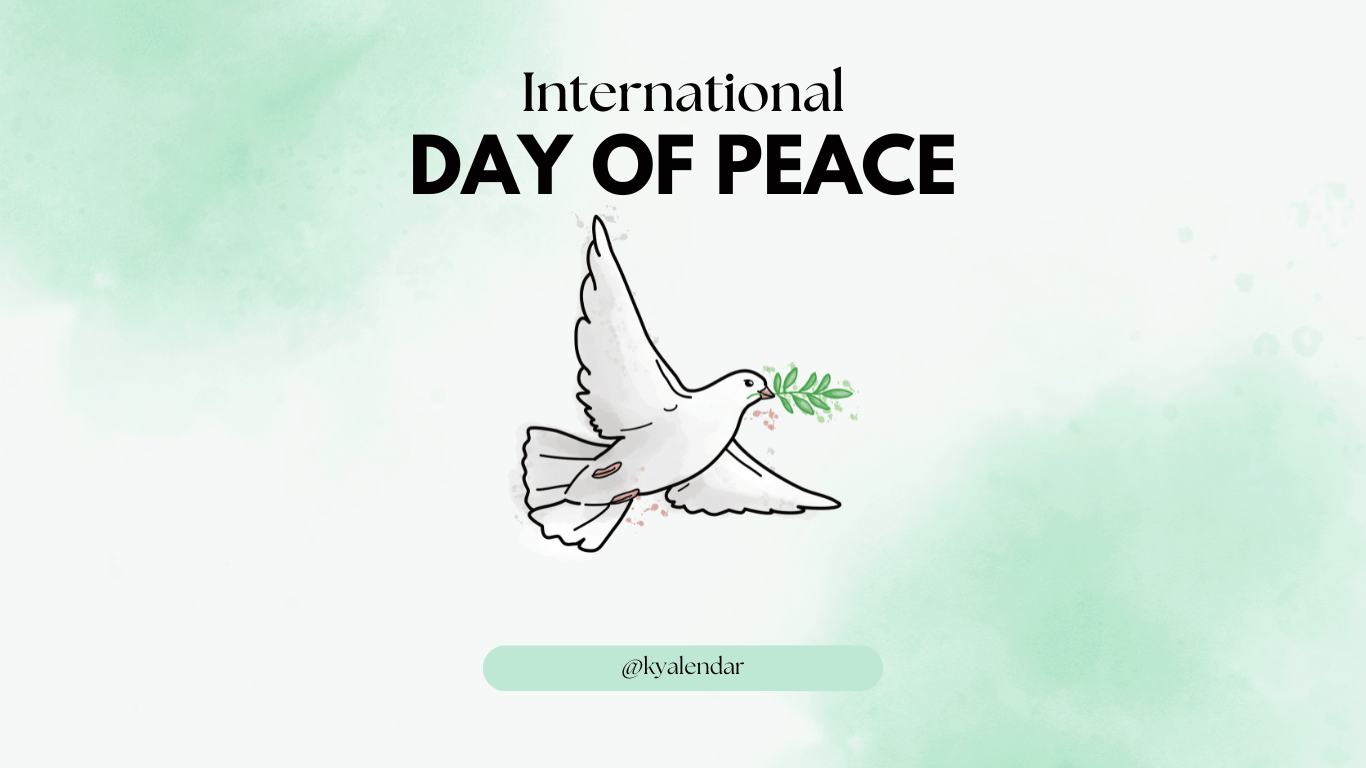
- This event has passed.
International Day of Peace
September 21

The International Day of Peace, observed annually on 21st September, is a significant occasion dedicated to fostering global harmony and encouraging a collective commitment to peace. Established by the United Nations, this day is an opportunity for individuals, communities, and nations to come together and advocate for the peaceful resolution of conflicts, the promotion of human rights, and the nurturing of a culture of understanding and cooperation.
Historical Background and Significance
The International Day of Peace was established by the United Nations General Assembly in 1981 through resolution 36/67. Initially, the day was designated for the strengthening of the ideals of peace and to be observed as a day of global ceasefire and non-violence. In 2001, the General Assembly unanimously adopted a resolution to observe the day as a period of non-violence and ceasefire, further underscoring its commitment to global peace efforts.
The significance of this day lies in its universal appeal and its call to action for peace on multiple levels—personal, local, national, and international. It encourages people to reflect on the importance of peace in their lives and the broader implications of peace on the global stage.
Themes and Observances
Each year, the International Day of Peace is associated with a specific theme, chosen to highlight a particular aspect of peace and to guide global activities. Themes have included topics such as climate action, education for peace, and the importance of international cooperation.
1. Educational and Community Activities: On this day, educational institutions, community organisations, and non-profits around the world organise events and activities aimed at promoting peace and understanding. These may include workshops, discussions, peace rallies, and cultural events that highlight the importance of resolving conflicts and building bridges between different communities.
2. Ceasefire and Conflict Resolution: One of the core aspects of the International Day of Peace is its emphasis on ceasefire and the cessation of hostilities. In conflict zones, this day serves as a call for temporary peace to allow humanitarian aid and dialogue to take place. Efforts to broker peace agreements or negotiations are often highlighted and supported on this day.
3. Reflection and Remembrance: The day is also marked by moments of reflection and remembrance for those who have suffered from violence and conflict. Memorial services, vigils, and moments of silence are observed to honour victims and to renew commitments to preventing future conflicts.
4. Public Statements and Campaigns: Leaders, activists, and organisations often use this day to issue public statements or launch campaigns advocating for peace. These communications may address specific conflicts, human rights issues, or broader calls for global cooperation and understanding.
Global Impact and Challenges
The International Day of Peace serves as a powerful reminder of the ongoing challenges and opportunities in the quest for global peace. While the day itself promotes positive actions and dialogue, the broader context involves addressing complex issues such as poverty, inequality, political instability, and environmental degradation.
Efforts to achieve lasting peace require continuous and multifaceted approaches, involving governments, civil society, and individuals. The International Day of Peace contributes to this by encouraging a collective commitment to these goals and by highlighting successful peace initiatives and models for resolution.
Ways to Participate
Individuals and organisations can participate in the International Day of Peace in various ways:
1. Organising or Attending Events: Participate in or organise events that promote peace, such as discussions, art exhibitions, or community gatherings.
2. Engaging in Dialogue: Engage in constructive dialogue with others to promote understanding and resolve conflicts.
3. Supporting Peace Initiatives: Support organisations and initiatives working towards peace and conflict resolution through donations or volunteer work.
4. Educating Others: Use the day as an opportunity to educate yourself and others about the importance of peace and the role each person can play in fostering a more harmonious world.
Conclusion
The International Day of Peace is a vital occasion that calls for reflection, action, and commitment to a more peaceful world. By observing this day, individuals and communities globally renew their dedication to resolving conflicts, promoting human rights, and building a culture of peace. It is a day to celebrate the progress made towards peace and to reinforce the collective efforts needed to address the challenges that remain. Through education, dialogue, and active participation, we can all contribute to making the ideals of the International Day of Peace a reality.